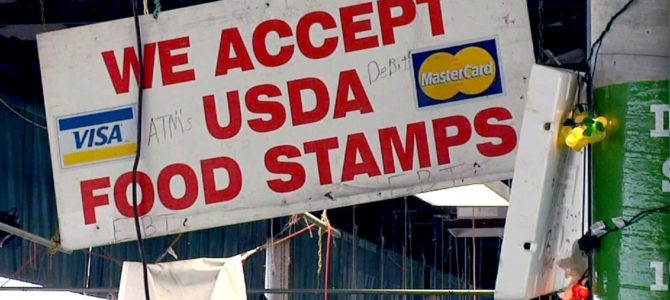Major theft is happening every day across the country, often unnoticed and rarely prosecuted: It is welfare fraud, and the cost is high. Thieves are stealing from taxpayers when they rob the public of funds that were meant for the truly needy. But this theft isn’t taking place in broad daylight. It’s hidden in a dusty pile of paper in the basements of government agencies.
So, it gets ignored. But the welfare system is being scammed across the country — and it’s having a major impact.
1. Lying About Income And Assets
To be eligible for most welfare programs like food stamps and Medicaid, individuals have to demonstrate need based on low income. The law expects the applicant to be honest and the state agency administering the program to thoroughly check and verify what the individual reports. But unfortunately, this isn’t always the case.
In Maine, a man was convicted of stealing more than $20,000 in benefits from food stamps and social security, after it was revealed he failed to declare the income from a $110,000 cash payment and $1,000 a month. This fraud can be prevented if agencies administering welfare are required to use the best data available and carefully verify the reported income of each household applying for welfare.
2. Lying About Residence And Members Of Household
Welfare eligibility is also determined by state of residence and how many people live in a home — but this is often falsified by applicants or missed by government workers who do not initiate sufficient verification checks. Someone may fail to report that they are married or that another adult lives in the household, allowing them to avoid reporting that person’s income as part of the household.
In Maine, a woman intentionally failed to report that her husband lived with her, making her eligible for hundreds of thousands of dollars in cash welfare, food stamps, and Medicaid. Meanwhile, she and her husband had a combined income of more than six figures, while she was receiving taxpayer-funded welfare benefits.
States are finding that their welfare cards, called Electronic Benefit Cards (EBT cards), are being used exclusively outside state lines, indicating people are signing up for benefits in one state and living off those benefits in another state. In Arkansas, they found more than 43,000 people on welfare that didn’t live in the state, and 7,000 never lived there at all. And Maine found EBT cards used in states all across the country, with thousands of public welfare dollars spent at Disney World and Las Vegas—money that could have been going to the truly needy.
3. Welfare Cards Used In The Drug Trade And Criminal Underworld
States face serious drug problems, and unfortunately, welfare EBT cards are often helping to fuel the drug crisis. In states across the country, drug dealers are being caught by law enforcement with drugs, weapons, and multiple EBT cards used to buy drugs in their possession.
Worse yet, welfare EBT cards have become an important currency in the drug underworld. A Maine Drug Enforcement Agency agent said that it has become “commonplace” for welfare EBT cards to be traded for drugs.
4. The Welfare Walking Dead
States around the country have found dead people showing up on their welfare rolls.
Pennsylvania found more than 2,300 dead people receiving welfare in 2016. Often times when this happens, the deceased’s welfare cards continued to be used by someone else like in this case from Maine.
5. Stores Scam Food Stamps To Make A Profit
Hundreds of thousands of stores around the country are registered to accept food stamps, but some illegally help recipients turn food stamp dollars on an EBT card into cash.
In Florida, police discovered an EBT fraud ring where vendors were exchanging cash for food stamp transactions, charging 12 people with more than $20 million in welfare fraud. In Maine, a store owner was investigated by the Department of Health and Human Services and the FBI, who determined that the store owner and his brother were committing millions in food stamp and wire trafficking fraud. In Birmingham, Alabama, 17 people were arrested at multiple stores for helping welfare recipients turn EBT cards into cash for drugs and wiring the profits to Yemen.
These crimes are happening every day — resulting in stolen resources from the truly needy and the robbery of taxpayer money that could be spent on education, public safety, and roads. As welfare reform debates occur in state capitals around the country, it is important to remember that when welfare fraud is allowed to continue, it is the truly needy and the taxpayers who suffer.









